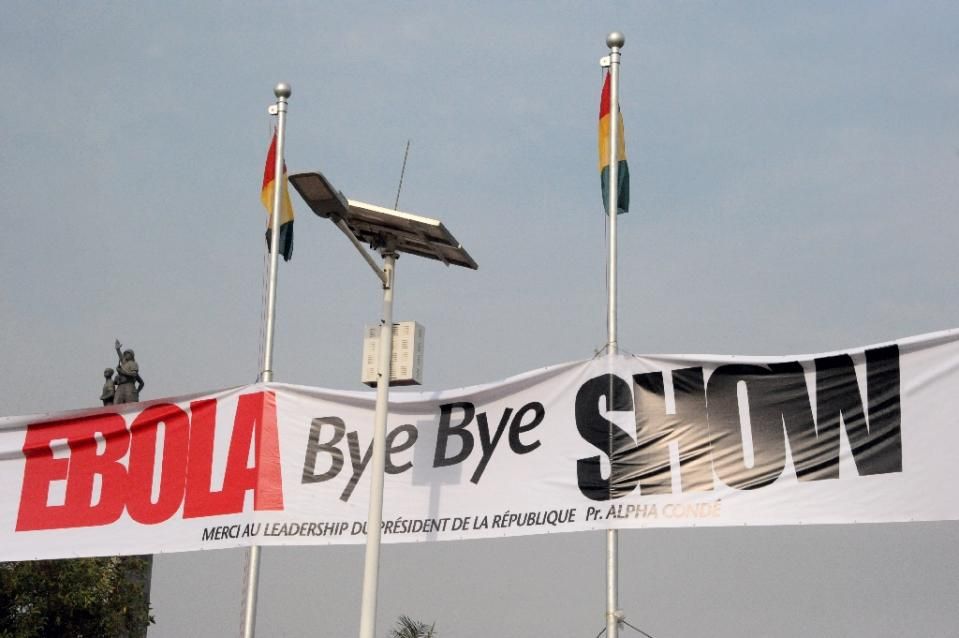 The world breathed a sigh of relief Thursday as a two-year Ebola epidemic that killed 11,000 people and triggered a global health alert was declared over, with Liberia the last country to get the all-clear.
The world breathed a sigh of relief Thursday as a two-year Ebola epidemic that killed 11,000 people and triggered a global health alert was declared over, with Liberia the last country to get the all-clear.
The deadliest outbreak in the history of the feared tropical virus wrecked the economies and health systems of the three worst-hit west African nations after it emerged in southern Guinea in December 2013.
At its peak, it devastated Guinea, Liberia and Sierra Leone, with bodies piling up in the streets and overwhelmed hospitals recording hundreds of new cases a week.
"Today the World Health Organization declares the end of the most recent outbreak of Ebola virus disease in Liberia and says all known chains of transmission have been stopped in West Africa," the UN health agency announced in Geneva.
UN chief Ban Ki-moon has warned the region can expect sporadic cases in the coming year but added "we also expect the potential and frequency of those flare-ups to decrease over time".
"The end of Ebola transmission in west Africa is testament to what we can achieve when multilateralism works as it should, bringing the international community to work alongside national governments in caring for their people," he told a General Assembly briefing on Wednesday.
"Let us pledge to maintain our vigilance, our commitment and our solidarity for the people of west Africa and our world."
Liberia, the country worst hit by the outbreak with 4,800 deaths, discharged its last two patients from hospital – the father and younger brother of a 15-year-old victim – on December 3, 2015.
Fear of global pandemic
Africa's oldest republic was the last country still afflicted by the outbreak that infected almost 29,000 people and claimed 11,315 lives, according to official data.
The real toll is suspected to be much higher, with many Ebola deaths believed to have gone unreported.
After the last patient is declared in the clear, a 42-day countdown -- twice the incubation period of the virus -- begins before the country is proclaimed Ebola-free.
Ebola causes severe fever and muscle pain, weakness, vomiting and diarrhoea. In many cases it shuts down organs and causes unstoppable internal bleeding. Patients often succumb within days.
The virus is spread through close contact with the sweat, vomit, blood or other bodily fluids of an infected person, or the recently deceased.
From a Guinean infant who was the first victim the epidemic quickly spread into neighbouring Liberia and Sierra Leone, notching up more deaths than all other Ebola outbreaks combined.
Liberia was first to be declared free of human-to-human Ebola transmission in May, only to see the virus resurface six weeks later. It was officially credited with beating the epidemic for a second time in September before another small cluster of cases emerged.
Mali, Senegal and Nigeria also recorded a small number of cases.
The WHO came under fire for its sluggish response to the epidemic, which local healthcare systems were woefully underequipped to handle. Over 500 healthcare workers died in three west African countries at the height of the outbreak.
Economic ruin
While Cuba sent doctors, Western governments offered little until foreign aid workers started falling ill and returning home for treatment, sparking fears of a global pandemic.
The concerns inched higher when three cases of infections came to light outside Africa – two in the United States and one in Spain.
The US, Britain and other countries eventually rallied to the cause, sending thousands of troops and medics to Africa in 2014 and developing a number of promising potential vaccines and treatments.
But the economic ravages of the epidemic are still being felt.
The World Bank estimates the economic damage of the outbreak, which devastated the mining, agriculture and tourism industries in Liberia, Sierra Leone and Guinea, at $2.2 billion over 2014-15.
"Ebola has reduced me to a pauper," said textile dealer Mohamed Sow, one of numerous entrepreneurs interviewed by AFP in Sierra Leone this week, describing how his creditors skipped town when the outbreak started.
On the health front, many painful lessons have been learned.
An overhaul of the WHO's epidemic response guidelines means the deployment of medical staff, virus-blocking suits, medicines and other material is likely to be much faster next time.
WHO director Margaret Chan described the next three months as "the most critical," as foreign medical groups shut down operations in west Africa and national health ministries take over.
Russian President Vladimir Putin claimed Wednesday his country had developed an Ebola vaccine, although he did not say what it was called, how it worked, who was developing it or if it had gone through trials.
Source: AFP
 В Атырау -10
В Атырау -10